#louis bourgeois
Text

The Hour is Devoted to Revenge (1999)
© Louise Bourgeois
10K notes
·
View notes
Text
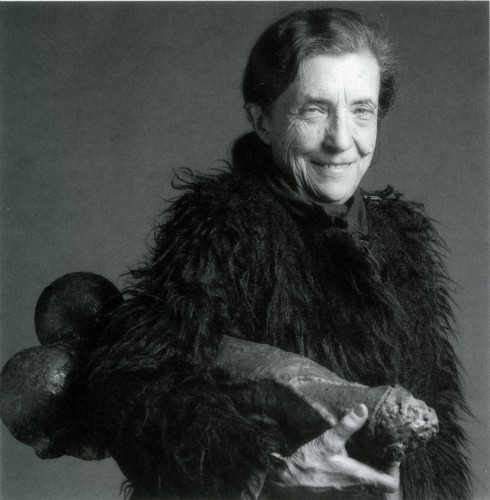
Portrait of Louise Bourgeois with Fillette, 1968, by Robert Mapplethorpe, 1982
"I have nothing against the penis. It's the wearer." - Louise Bourgeois
58 notes
·
View notes
Text
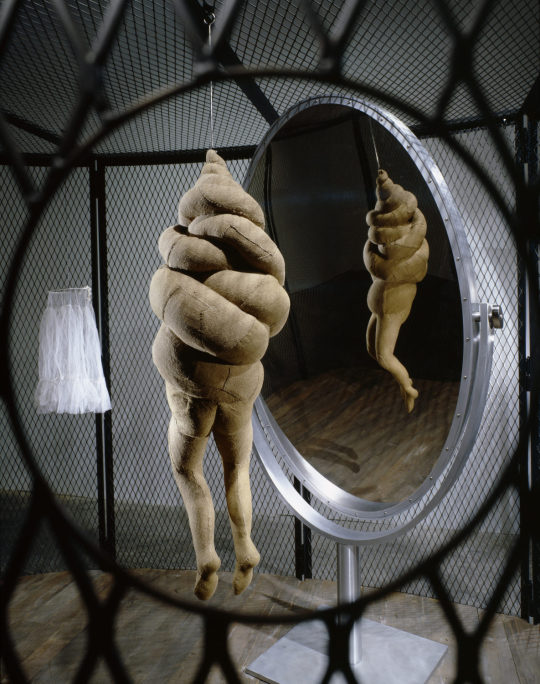
Louise Bourgeois, Cell XXVI, 2003.
#contemporary art#contemporary artist#female artists#art#artist#installation#Louis Bourgeois#womens art
85 notes
·
View notes
Text
I wish there were more black people who were into iwtv so I can talk about how Louis's class and race interests intersected
#iwtv#amc iwtv#iwtv 2022#its so crazy cus hes from a rich lightskin family in new orleans#like he says hed be a free man of color (not black) if not for jim crow#the intraracial dynamics of new orleans pre-1970 is so genuinely interesting to me and we never get to really get into them bc louis spends#all his time with white/nonblack people and when he is with his black daughter its different bc theyre so isolated from the great black com#like louis was absolutely in jack n jill as a kid. hed be in a blue vein society. hed be an alpha based off his name alone like#hes the black bourgeois class and its so crazy that people say hes middle class in fanworks like no babe. they had darkskin servants#i think it also stems from people relating blackness to poorness. ldpdl is not poor in any sense of the word#he inherented a literal plantation!!!! but because hes black people downplay his class interests (except for other black people)#yknow who really was poor? lestat! like eating syrup sandwiches with the lights and water cut off by the city poor#and yet people act like he grew up hyper rich in fanworks and its like... thats not what happened#you can talk about how jim crow and white supremacy squashed/manipulated the black elite class in nola while acknowledging louis' class#like they both came into the relationship with money (louis' money might have been shorter than lestats#but they still had money)#ldpdl#like i would even wager that louis family dont even consider themselves black like that#cus blackness is defined by whiteness and since louis spends all his time with white people bc of his business hes treated as and sees him-#self as black in a way that his family isnt. theyre only black when theyre made black if that makes sense#theyre black when white people are around
26 notes
·
View notes
Text
once again thinking about how almost every vampire had some artistic inclinations as mortals that’s carried into the dark gift whether it’s musical talent or artistic skills or even Daniel’s journalistic affinity.
and then there is louis, who was just. rich and drunk.
#he's cultured of course i just think it's so funny that like. he was not kidding when he said he was BORING as a mortal!!!#just thinking about how much i love all the headcanons of like. lestat doing community theatre or armand returning to painting#louis doesn't really have any hobbies like that lmfao he was a bourgeois plantation owner who kinda Sucked#*【 ❛I'm not the spirit of any age. ❜ 】 ➤ OOC
21 notes
·
View notes
Text
“Unheroic though bourgeois society may seem, heroism had been needed to bring it into being — heroism, self-sacrifice, the Reign of Terror, civil war, and the slaughter of the battle-fields.”
— Karl Marx, The Eighteenth Brumaire of Louis Bonaparte
#Karl Marx#Marx#The Eighteenth Brumaire of Louis Bonaparte#Marx quotes#napoleonic era#napoleonic#bourgeois#history#18th brumaire of Louis Bonaparte
5 notes
·
View notes
Text
youtube
Thomas-Louis Bourgeois - Ariane
I. Récit "Sur un rocher affreux" 00:00 II. Prélude "Déserts où m'abandonne un ingrat" 1:19 III. Récit "Cette amante 5:20 IV. Ariette gayement "Mille trompettes" 6:13 V. Récit "Dans cette affreuse solitude" 9:24 VI. Ariette mouvement de gavotte "Une cruelle perfidie" 11:14
Performer: Ensemble La Française.
2 notes
·
View notes
Note
don't know about gabrielle but nicki will for sure have green eyes.. they're going to play up the similarities with that i think instead of making them literally twins
oh that could be interesting too i forgot about nicki . exciting prospect. matching w gabrielle is still the more fucked up one so i want that more but thats also a possibility
#theyre not making them physically resemble one another as humans like that would be logistically difficult and narratively boring#lestat said you have no twin!#so the eyes are an option. but they could also not have them resemble each other remotely like w antoinette#and the parallels are still evident#also this is controversial and i may b just forgetting key details but i dont actually think louis and nicki are that similar in personalit#besides in terms of self destructive depression. and bourgeois background#like louis would NEVER run away from home at 18 to pursue his true passions#iwtv
4 notes
·
View notes
Text
Whether it was a question of the right of petition or the tax on wine, freedom of the press or free trade, the clubs or the municipal charter, protection of personal liberty or regulation of the state budget, the watchword constantly recurs, the theme remains always the same, the verdict is ever ready and invariably reads: “Socialism!” Even bourgeois liberalism is declared socialistic, bourgeois enlightenment socialistic, bourgeois financial reform socialistic. It was socialistic to build a railway where a canal already existed, and it was socialistic to defend oneself with a cane when one was attacked with a rapier.
This was not merely a figure of speech, fashion, or party tactics. The bourgeoisie had a true insight into the fact that all the weapons it had forged against feudalism turned their points against itself, that all the means of education it had produced rebelled against its own civilization, that all the gods it had created had fallen away from it. It understood that all the so-called bourgeois liberties and organs of progress attacked and menaced its class rule at its social foundation and its political summit simultaneously, and had therefore become “socialistic.” In this menace and this attack it rightly discerned the secret of socialism, whose import and tendency it judges more correctly than so-called socialism knows how to judge itself; the latter can, accordingly, not comprehend why the bourgeoisie callously hardens its heart against it, whether it sentimentally bewails the sufferings of mankind, or in Christian spirit prophesies the millennium and universal brotherly love, or in humanistic style twaddles about mind, education, and freedom, or in doctrinaire fashion invents a system for the conciliation and welfare of all classes. What the bourgeoisie did not grasp, however, was the logical conclusion that its own parliamentary regime, its political rule in general, was now also bound to meet with the general verdict of condemnation as being socialistic. As long as the rule of the bourgeois class had not been completely organized, as long as it had not acquired its pure political expression, the antagonism of the other classes likewise could not appear in its pure form, and where it did appear could not take the dangerous turn that transforms every struggle against the state power into a struggle against capital…
Thus by now stigmatizing as “socialistic” what it had previously extolled as “liberal,” the bourgeoisie confesses that its own interests dictate that it should be delivered from the danger of its own rule; that to restore tranquillity in the country its bourgeois parliament must, first of all, be given its quietus; that to preserve its social power intact its political power must be broken; that the individual bourgeois can continue to exploit the other classes and to enjoy undisturbed property, family, religion, and order only on condition that their class be condemned along with the other classes to like political nullity; that in order to save its purse it must forfeit the crown, and the sword that is to safeguard it must at the same time be hung over its own head as a sword of Damocles."
-Karl Marx, The Eighteenth Brumaire of Louis Bonaparte, 1852
2 notes
·
View notes
Text
Blue haired boy but it's Chloe and Sabrina's other kid (in Louis's class) and Louis
Now I wanna draw these goobers
#the history book on the shelf is always repeating itself#Spotify#blue haired boy#music#headcanons#kinda#Louis Dupain-Cheng#Louis agreste#chloe bourgeois#sabrina raincomprix#rambles
1 note
·
View note
Text
I’ve talked about it before, but it’s so sad/frustrating how Jean Valjean is the kind of person who will like…. buy Cosette presents “to take her mind off things” instead of talking to her openly. He doesn’t try to help Cosette understand as much as he tries to “bring her back to happiness” by giving her gifts.
She’s upset over seeing the chain gang, and instead of answering her questions he takes her to a great fun festival the next day to keep her mind off it.
She’s upset over his behavior in the end of the book, and his response is to dodge her questions and interrupt to encourage her to buy fun little fripperies and pieces of furniture:
“It is cold here. One cannot see distinctly. It is abominable, that it is, to wish to be Monsieur Jean! I will not have you say ‘you’ to me.”
“Just now, as I was coming hither,” replied Jean Valjean, “I saw a piece of furniture in the Rue Saint Louis. It was at a cabinet-maker’s. If I were a pretty woman, I would treat myself to that bit of furniture. A very neat toilet table in the reigning style. What you call rosewood, I think. It is inlaid. The mirror is quite large. There are drawers. It is pretty.”
Cosette sincerely wants to know about these darker more tragic aspects of the world and her own life, but Jean Valjean keeps showering her with all these gifts that represent shallow bourgeois respectability instead, not understanding that they don’t actually make her happy.
It’s just
“Can we talk about why you’ve stopped callling yourself my father and seem to no longer be eating? I’m worried that you’re in a bad state and are hurting yourself.”
“Let’s not talk about that—what if you bought a magnificent table instead? :3 wouldn’t that make you happier?”
#les mis#les mis letters#lm 5.8.1#Jean Valjean#cosette#Jean Valjean is a frustrating little guy sometimes
93 notes
·
View notes
Text
i can't believe ppl are still debating ep 5....like come on! use your brains for once.
i'm going to start blocking ppl for calling the dv scene 'shock value' or out of character. it's neither of those things and straight up the beginning of that scene comes almost directly from the books.
"And our fragile domestic tranquility erupted with his outrage. He did not have to be loved but he would not be ignored; and once he even flew at her, shouting that he would slap her, and I found myself in the wretched position of fighting him as I'd done years earlier before she'd come to us." (IWTV p. 104)
yeah is the scene in ep 5 more graphic/brutal? sure. but one could argue that louis in the book is playing down the violence in order to maintain the image he's painted of lestat as a weak, stupid failure of a mentor. in opposition to the book, the show has added claudia's account as corroboration of the abuse that they experienced as well as the scale and scope of that abuse. later in the book when claudia proposes that they leave together, louis says this:
"I could hear a vague mingling of sounds now, which meant he had entered the carriage way, that he would soon be on the back stairs. And I thought of what I always felt when I heard him coming, a vague anxiety, a vague need. And then the thought of being free of him forever rushed over me like water I'd forgotten, waves and waves of cool water." (IWTV p. 117)
i don't know about anyone else but this reads to me as an abused spouse hearing their abuser come home. i also think that this vague anxiety and vague need that book louis describes here is etched all over ep 6. the louis of ep 6 is Extremely submissive and placating to lestat in a way he never has been in the previous eps because he's afraid of him. at the beginning of ep 5 itself he straight up tells lestat to shut the fuck up and in the middle he goads lestat by making fun of his intelligence. the contrast is stark and why? because he has been given a fuller picture of the sheer magnitude of lestat's strength and power and knows that it can be turned onto him or claudia. to say that the show doesn't reference the violence after that ep is absolutely ludicrous. claudia references it directly!

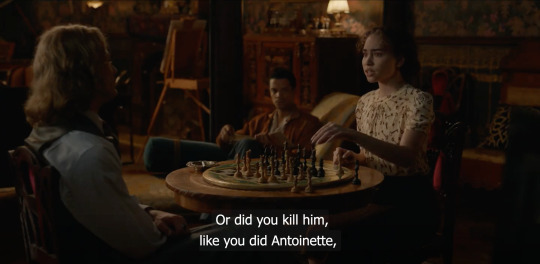
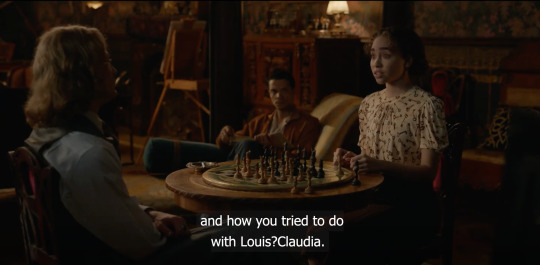
this is only one example of several in this ep. the violence was necessary to make the urgency of louis and claudia's need to leave make sense. if lestat wasn't keeping them there with the unspoken threat of repeated violence why would claudia need to scheme and plot to walk out the front door? she did it at the beginning of ep 5, why couldn't she do it again? claudia is older in the show than the book, she's not a 5 year old trying to brave it on her own, the modern conceptualization of the teenager didn't exist, she could reasonably get by. the dv scene was necessary to account for the new context of the characters.
also the slave/master dynamic was not created wholesale by the show writers, that's straight up from the book:
"The vampire made a slave of him, and he would be no more a slave than I would be a slave, and so he killed him. Killed him before he knew what he might know, and then in panic made a slave of you. And you've been his slave." (IWTV p. 120)
they have claudia say this in the show practically verbatim. they didn't add this just to make on the nose points about race, they simply expanded on what already existed in the book. the fact that claudia and louis in the show are black make this sentiment more uncomfortable but it's not any less true. in fact, i think it adds to why claudia refuses to let the situation continue. the transgression becomes more egregious because of the larger implications of white frenchman lording his status over his black creole subordinates (this where lestat's 18th century roots become so interesting as well as his aristocratic heritage. i also think it's interesting that you have lestat = aristocrat; louis = bourgeois; claudia = working class/poor as their economic backgrounds but that's a different post).
if the showrunners were to walk this back i legit would be pissed. it would be such a cheap shot to write such a brutal, narratively cruel scene (i mean this as a compliment) that contextualizes one of the main character's motivation, plot, and worldview (claudia and to an extent louis) and then be like 'jk nevermind, louis was lying! claudia was exaggerating! it wasn't that bad actually!'. like that's just bad writing. it also would be racist. i actually love ep 5, all of it. i've never been to affected by an ep of television in my life and i think it's so brilliantly written. do i think it complicates the loustat relationship? sure but i'm not watching this show because of ships, i'm watching it because it's some of the best crafted television i've seen in years. it's not afraid to piss off fans in favor of a better, more compelling narrative choice and that's why i respect and trust writers more than i do for most other shows.
i also need to emphasize that i love lestat. he's my special boy and has been one of my favorite characters for like 16 years. ep 5 did not diminish that for me, i love how it works in relation to his backstory and how in the books lestat does not break the cycles that terrorized him as a child/young adult. he continues them by putting himself as the perpetrator and isn't that what he does ep 5? the writers get these characters, the actors get these characters. i still think lestat is wildly sympathetic and that's a testament to how strong the writing, directing, and performances on this show are.
anyway, let's all start talking about a different ep, this one has been discoursed to death
#i'm SICK of loustat shippers trying to wish ep 5 away so they don't have to think critically about this ship#and i say this as a loustat fan!#shock value doesn't mean 'i watched it and was shocked!'#shock value means it was added in for no larger narrative purpose other than to be gratuitous. which this scene wasn't. so.#also sorry if this is a bit incoherent i saw a post and got very angry and did all of this#iwtv#tvc#vampterview
126 notes
·
View notes
Note
Good starting points for socialist reading? Detailed medium form summaries? Skeptic debate between various forms, and between other theoretical systems? Please do recommend
For introductory texts, start with the basics. That means starting with the foundation laid out by Marx and Engels themselves, not some abridged text or modern compilation that seeks to re-explain scientific socialism out of a lack of agency for the modern reader (though some of these type are good, but I digress.)
For this i’d recommend:
- Marx, Engels. The Communist Manifesto (obviously)
- Engels. Socialism: Utopian and Scientific
- Marx, Engels. Wage-Labour and Capital/Value, Price, and Profit
The above three are very short, succinct, and informative. The latter two are woefully unrecognized as ideal texts for introductory socialism, and they were written for that explicit purpose.
After that, move on to more wholistic works that flesh out and elaborate upon the historical, material, circumstances that gave rise to the capitalist epoch and how and why they furnish the future conditions for a socialist system.
- Engels. Origin of the Family, State, and Private Property (Whatever copy you’ll procure will probably include his complimentary essay, The Part Played by Labour in the Transition from Ape to Man, which isn’t hugely beneficial for most discursive purposes but interesting, nonetheless.)
- Lenin. The State and Revolution
- Bukharin. Historical Materialism - A System of Sociology
All of Engels’ work, from his introductions to Marx’s texts, his input on the former, and his original treatises, are a wealth of information.
After the structure of dialectical materialism and the capitalist system are understood, I’d recommend works on how the former can/should be implemented and the latter’s historical reign of misery, as well as works addressing the pressing contradiction of imperialism and core-periphery subjugation. (You won’t find vocabulary like core/periphery/semi periphery in texts like this though, that wouldn’t come about until Immanuel Wallerstein outlined the World Systems Theory in his eponymous book. It’s not strictly a historical materialist work, and made by a bourgeois academic (who was the sociology professor of my sociology professor, which is fun I suppose) but is formative for much of contemporary sociological discourse).
- Lenin. Imperialism: The Highest Stage of Capitalism
- Lenin. What is to Be Done?
- Galeano. Open Viens of Latin America: Five Centuries of the Pillage of a Continent
- Said. Orientalism
Along the way, I strongly suggest you actually read Marx’s Capital in full, at least the first volume. It’s not as monolithic and inaccessible as some would lead you to believe, quite the opposite, and cannot be understated in its utility and insight.
- Marx. Capital: A Critique of the Political Economy, Volume I
Other recommendations:
- Marx. Critique of the Gotha Programme
- Marx. The Eighteenth Brumaire of Louis Bonaparte
- Bevins. The Jakarta Method: Washington's Anticommunist Crusade and the Mass Murder Program that Shaped Our World
- Bevins. If We Burn: The Mass Protest Decade and the Missing Revolution
- Lenin. Critical Remarks on the National Question (1913) (Also, can be found in the recent compilation of Lenin’s work on the subject called Imperialism and the National Question)
- Debord. The Society if the Spectacle
- Benjamin. The Work of Art in the Age of Mechanical Reproduction
- Mishra. From the Ruins of Empire: The Revolt Against the West and the Remaking of Asia
Truth be told, I’m a grievously under-read marxist, and there are others on this site who could provide a more comprehensive syllabus. To half-assedly make up for it, here are some books i’ve been meaning to read/finish but haven’t gotten to it yet:
- Adorno, Horkheimer. Dialect of Enlightenment
- Marx. Capital, Volumes 2 and 3
- Strong. The Soviets Expected It
- Adorno, Bernstein. The Culture Industry
- Adorno. Minima Moralia
- Mao. On the Correct Handling of Contradictions Among the People
- Mao. On Protracted War
All of the aforementioned reading can be found online, for free and readily accessible, on places like Marxists.org, or as downloads from places like Libgen. If you want to read on your phone, download the file as an epub and use your device’s proprietary Books app or similar. If you want to read on a PC, I’d recommend a PDF for easiest navigation. If you want to pursue the latter but can only procure the former, you can use a epub reading program like SumatraPDF. If you’re a person who values a physical copy highly enough to warrant a purchase, I’d recommend ThriftBooks, though do be attentive to buying the most suitable copy of whatever material. Also, I’d be happy to send my copies to you or anyone else, via a google drive or telegram, if you feel like coming off anon.
As for “skeptic debate between various forms, and between various systems,” I can’t think of a standalone work with the principle task of dissecting and contrasting various stripes of marxism, but you’ll find as such permeating throughout almost all of these texts. The thing is, the fundamental material conditions haven’t shifted substantially since these were written, wether it be in Marx’s 19th century, Lenin’s 20th, or Bevins’ 21st. The old enemies remain enemies, the old arguments remain true. Dialectical materialism, scientific socialism, is a malleable system. It is a scientific method by which one can analyze the world, understand it with rational clarity, and come to conclusions on how to react to it and make predictions as to how things may unfold. This is the task assigned to any student of marxism. It is not dogma or a ecclesiastical canon, it is a tool.
After you’ve garnered your bachelor’s degree in scientific socialism you can move on to the postgraduate courses, such as chainsmoking cigarettes, caffeine and amphetamine addiction, alcoholism, and playing Disco Elysium.
#anonymous#if anyone has further material they’d like to recommend or something they’d like to espouse upon#please feel free to add
24 notes
·
View notes
Text
Women artists in Napoleonic France

(Young women copying: ‘Love begging Venus to forgive Psyche’ which was displayed at the 1808 Salon. Sketch by Georges Rouget)
Quotes from an article about women’s participation in the art world during the Napoleonic era.
Article:
Heather Belnap Jensen, “The Journal des Dames et des Modes: Fashioning Women in the Arts, c. 1800-1815,” Nineteenth-Century Art Worldwide 5, no. 1 (Spring 2006) (source)
“More and more women artists began exhibiting their work in public venues and receiving recognition for their contributions at this time. While only three women artists had participated in the 1789 biennial Salon, fifty participated in the Salon of 1806–an increase in women’s participation of over 1600 percent in seventeen years.”
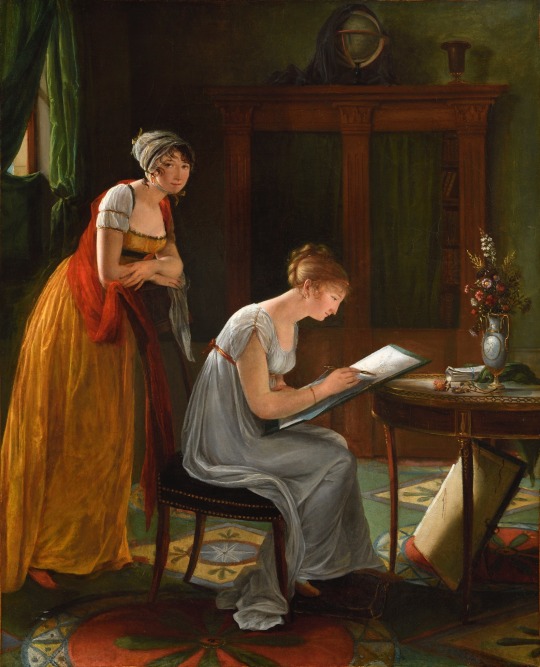
(Woman artist giving a drawing lesson — Self-portrait, 1810, by Louise-Adéone Drölling)
“We see a move away from the emphasis on the public sphere to the private space as motifs, intimating a valorization of a woman’s world. While history painting, which played such a crucial role in Revolutionary visual culture, remained the privileged genre at the turn of the century, the rise in portraiture, landscape, and genre painting in Napoleonic France indicates this shift in values.”
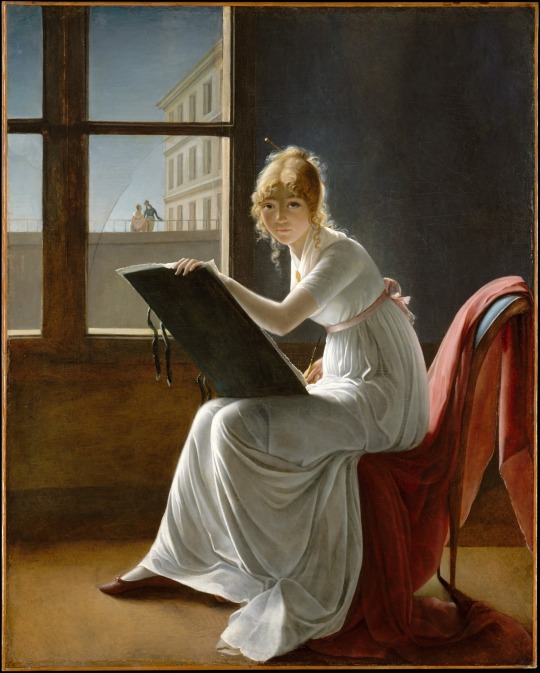
(Young Woman Drawing—Portrait of Charlotte du Val d'Ognes, 1801, by Marie-Denise Villers)
“Women’s journals, which often published art-related materials, have been largely overlooked in discussions of developments in late eighteenth-and early nineteenth-century French visual culture. This is surprising, given that bibliographies on art criticism of this period frequently cite items from these publications.”
One of the most influential women’s journal of the period was Journal des Dames et des Modes. It was created by Jean-Baptiste Sellèque and Pierre de La Mésangère in 1797 and continued until 1839.
“La Mésangère’s key collaborator during the Napoleonic period was a woman, Albertine Clément, née Hémery, a well-known figure in both journalistic and cultural circles in post-Revolutionary France, and that several women were regular contributors to this journal during this era.”
Annemarie Kleinert did a study on the journal:
“She determined that the journal targeted bourgeois women between the ages of 18 and 40 years old who could afford the annual subscription rate of 10 livres, and that the majority of subscribers during the period from 1800 to 1815 were from the provinces.”

(Portrait of a Young Woman Drawing Herself, early 1800s, by Louis-Léopold Boilly)
Interest from women in creating their own designs:
“Fashion plates that accompanied each issue of this journal gave visual testimony to this heightened interest in women’s artistic engagement. Indeed, women in fashion plates were sometimes presented in the act of sketching and drawing, as shown in a plate that appeared as an insert in an 1802 issue of the Journal des Dames et des Modes.”
The act of women creating art was compared to motherhood. In that way, women were encouraged to make art, but in terms which enforced traditional and patriarchal ideas:
“Furthermore, the vocabulary used by the author stresses the ways in which artistic creativity mirrors childbirth and elicits feelings of exaltation over one’s art that are similar to those evoked by motherhood when he writes that ‘she smiles at the objects which are born of her colors’ and calls the site of her production a ‘creative space.’”
There were opportunities for women to paint nude subjects for classical style art:
“Recent scholarship suggests that there were opportunities for such study in the Napoleonic era. By 1800, female students could attend anatomy classes given by the surgeon Sue and also by the École du Modèle Vivant at Versailles, and artist Adele Romilly reported that David, Régnault, and Guérin all provided mixed studios that offered courses on life drawing from the nude.”
One of the claims made against the women’s journals is that they were sexist. The author points out that it’s more complicated and not entirely true. The journals included laudatory reviews of paintings by female artists at the salons, biographies of women artists, such as Angelica Kauffmann, and published excerpts of pamphlets written by women, such as Angélique Mongez.
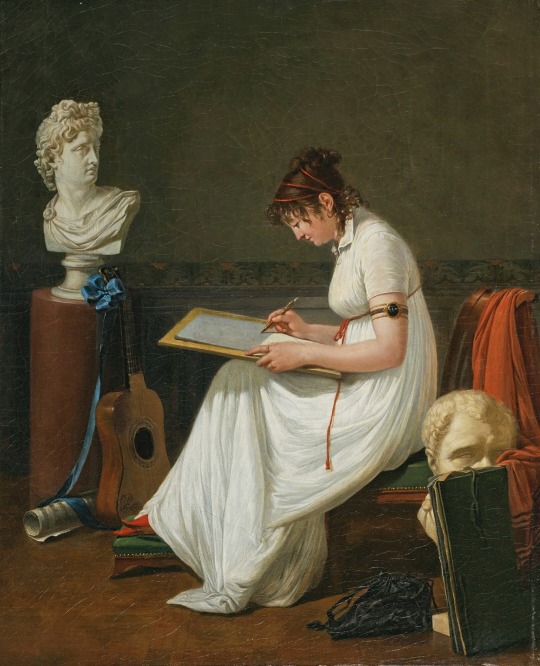
(Portrait of an Artist Drawing after the Antique, c. 1800s, Jean François Sablet)
However, the author also says there was a lot of anxiety about the increase in female participation in the art world, both as creators and as spectators. There were articles describing women at museums in derogatory terms. One in particular described a young girl being overcome by emotion at the sight of the statue of Apollo Belvedere and creating such a large scene that she had to be dragged away in tears.
These articles imply that women spectators had become dominant enough that it could inspire critics.
Women had become so important in the art world that a really unique phenomenon happened:
“Roger Bellet has demonstrated that there are known instances in late eighteenth-and early nineteenth-century France when men published under a female pseudonym.”
Many of the top artists who were admired in the era were women such as Élisabeth Louise Vigée-Lebrun, Marguerite Gérard, Constance Mayer, Adèle Romany, Adélaïde Labille-Guiard, Pauline Auzou, Jeanne-Elisabeth Chaudet, Marie-Guillemine Benoist, Constance Marie Charpentier and many others.
#art#women’s art#women artists#napoleonic era#napoleonic#mine#fashion#writing#first french empire#napoleon bonaparte#quotes#ref#reference#Journal des Dames et des Modes#19th century#1800s#fashion history#historical fashion#history of fashion#french empire#france#history#french revolution#frev#women’s history#womens art#women in art#women painters#fashion plates
61 notes
·
View notes


